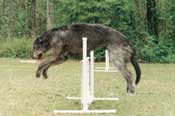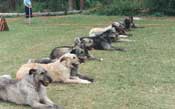IWADV Obedience Info
Training your dog for daily living and competition obedience

This article is about teaching your Irish Wolfhound to be a dog you and others will want to live with. Due to the size of Irish Wolfhounds, good manners are important. Nothing is worse than a large, out of control dog.
Teaching manners to your Irish Wolfhound is really not very different from the approach we use in training for competition obedience. There are a few simple rules that apply across the board.
Be consistent! You cannot expect a dog to learn if everyone in the household expects a different thing from the same command. Try and get everyone in on the training. Agree on what words you will use, and what you expect the dog to do.

Start early! There is no reason to wait till your dog reaches 6 months of age to begin training. Young puppies (4 to 5 months) learn simple commands very quickly. Learning to walk on lead should be taught at this age, along with sit. It is much easier to teach a 40 to 60 pound youngster than wait till you have a large dog in the 150 pound range.
Be gentle! Irish Wolfhounds do not respond well to heavy handed training. Despite their great size they are very sensitive dogs. You want a happy, well adjusted companion who is glad to comply with your commands, and enjoys your company as well.
No hitting or rough handling of the dog ever! A loud stern voice is usually all that is needed to get their attention. There is no reason for rough handling during a training session. This will only cause the dog to fear your commands. Training should be a positive, fun experience for you both.

Praise your dog when he does something right! Whether you use verbal praise along with petting, or the use of food for treats, make sure your dogs knows he did it right! Remember, most dogs DO want to please you.
When working with a training collar, small, short pops on the collar is what you want. The object is to get the dogs attention, not to choke him into submission.
Irish wolfhounds are quite easy to train once YOU understand they are quick learners who get bored very fast. Lengthy repetition is not needed as with many other breeds. Go over an exercise 2 or 3 times every other day. This is usually more than enough.
Be patient! If your dog is NOT learning, step back and examine how you are explaining what you want to the dog! Most dogs will gladly comply, if they can figure out what you want. If you get frustrated or start to lose your temper, stop!
I f you don't know where to start, take a course and learn. Check with local obedience clubs for the names of good training schools in your area. Remember that obedience schools are there to teach YOU how to train your dog. They do not train the dog for you!
f you don't know where to start, take a course and learn. Check with local obedience clubs for the names of good training schools in your area. Remember that obedience schools are there to teach YOU how to train your dog. They do not train the dog for you!
Over the past years I have put 2 obedience titles on 2 of my Irish Wolfhounds and am now working toward our first attempt in open. Did it take a lot of work... Yes! But we had a great time doing it. If you decide to go into competition obedience with an Irish Wolfhound you need to remember that you are doing it for fun. Competition is very stiff in the all breed arena. Most large dogs are at a disadvantage compared to the quick, lighting responses of the popular obedience breeds seen most often.
Can you compete in all breed obedience... Yes! I have gotten qualifying scores at all breed trials. The real secret is... Have fun! Enjoy the challenge of you and your dog learning to work as a team! You will be surprised at the deeper understanding and respect you will both gain from the experience.
Article by club member Donna Monahan.